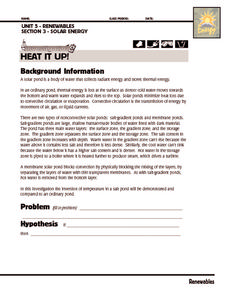Curated OER
Earth Movements
In this earth science worksheet, learners use the sheet for reinforcing vocabulary and core concepts. The answers are found and reviewed for the attainment of new knowledge.
Oregon State
World Map of Plate Boundaries
Young geologists piece together the puzzle of plate tectonics in an earth science lesson. Given a physical map of the world, they search for land formations that indicate the location of different types of plate boundaries.
Curated OER
Forces That Shape the Earth: Wind, Water and Erosion
In this forces of nature worksheet, students read a 2 page article on the forces of nature and answer 4 detailed comprehension questions about the forces of nature on Earth.
NOAA
Plate Tectonics I
Young geologists get a glimpse beneath the earth's surface in this plate tectonics investigation. After first learning about the different layers of the earth and the constant movement of its plates, young...
It's About Time
Plate Boundaries and Plate Interactions
How does the Earth continually repair itself? Explore the answer to this question, and others, with a unit on plate boundaries and interaction. Pupils classify the types of movement at plate boundaries and identify the...
K12 Reader
What Glaciers Leave Behind
Glaciers may seem distant and stationary, but they are huge deposits of moving ice that have made changes to the earth's surface. Your pupils can learn about the different types of impressions left by glaciers by reading the short...
Curated OER
Teaching About Plate Tectonics and Faulting Using Foam Models
Young scientists learn about plate tectonics and the three different types of faults (normal, reverse, and strike-slip) using foam models. The activity also covers common types of locations where these faults are found.
Curated OER
Predicting Plate Movement
For this plate movement worksheet, students review the 3 types of plate boundaries and predict where plates will be as they continue moving along their current path. This worksheet has 2 short answer questions.
Port Jefferson School District
Hurricane Katrina
Young scientists track Hurricane Katrina across the Atlantic Ocean as they learn about these destructive forces of nature. Provided with a table of data tracking the location and conditions of Katrina over a one week span, students...
Curated OER
Movement of Air
In this movement of air learning exercise, students identify and describe the purpose for convection and how it effects Earth. Then they describe what thermals are and why they occur in hot and cold air movements. Students also explain...
Curated OER
Forces in Earth
In this Earth's forces worksheet, students will review the characteristics of earthquakes, including types of faults. Students will interpret a seismograph read-out from an earthquake. Students will complete 10 fill in the blank...
Curated OER
Forces Inside the Earth
In this faults worksheet, students identify the three types of faults and the characteristics that define a normal fault, reverse fault, and a strike-slip fault. This worksheet has 3 fill in the blank and 3 short answer questions.
Texas State Energy Conservation Office
Investigation: Heat it Up!
This demonstration of solar ponds can be used in an earth, environmental, or physical science setting. Lab groups set up a solar pond and model how it is able, due to a salt concentration gradient, to maintain heat for future use.
Curated OER
Fossils
For this earth science worksheet, students use the clues given at the bottom of the sheet to solve the crossword puzzle on fossils. They identify specific names of fossils and how to make a mold of one.
Curated OER
Seismic Waves
In this seismic waves worksheet, student will read information about the different types of waves that occur during an earthquake: P (Primary) waves, S (Secondary) waves, and shear waves. Then middle schoolers will complete 2 short...
Curated OER
Plate Tectonics Vocabulary
In this plate tectonics worksheet, students match 9 terms with their definitions. Topics include the types of boundaries, the layers of the Earth's crust, plate tectonics and continental drift.
Curated OER
Earthquakes Study Guide
In this earthquakes worksheet, students answer questions about the components of earthquakes, the causes of earthquakes, how they are measured, the types of seismic waves and the types of faults. They also answer questions about the...
Curated OER
Plate Tectonics Review
In this plate tectonics worksheet, students review concepts such as the types of plate boundaries, the concept of continental drift, sea-floor spreading, earthquakes, and plate tectonics. They match 30 terms with their definitions.
Curated OER
Exploring Plate Tectonics
In this plate tectonics worksheet, students answer questions about plate movement, the types of boundaries, the history of Earth's crusts and plate tectonics. They use an on line source to get their answers.
Curated OER
A Model of the Rock Cycle
In this rock cycle worksheet, students use different colored crayons to represent different types of rocks. They follow step by step procedures to model the rock cycle with the crayons. Students draw the rock cycle, show weathering,...
Curated OER
Plate Tectonics Study Guide
In this plate tectonics learning exercise, students answer questions about plate tectonics including topics such as the lithosphere, the asthenosphere, rising and sinking convection currents, continental drift and the types of boundaries.
Curated OER
Theory of Plate Tectonics
For this plate tectonics worksheet, student answer 15 multiple choice questions about plate movement, types of boundaries, collision of plates, continental plates, and the lithosphere.
Owl Teacher
Introduction to World of Geography Test
Assess your learners on the five themes of geography and the most important key terms and concepts from an introductory geography unit. Here you'll find an assessment with 15 fill-in-the-blank and 14 multiple-choice questions, sections...
Curated OER
Rock Cycle
In this rock cycle worksheet, students simulate the changes that occur during the rock cycle using a sugar cube. They use the sugar cube to represent a rock and perform changes on the sugar cube that represent the stages of the rock cycle.























